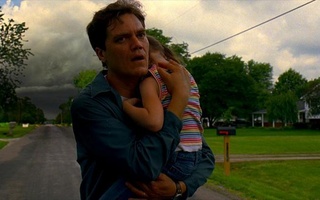{shortcode-3b9e364e7f521efdde93e095537f6de67f88f6a8}
“Siembamba, mama’s little child / Siembamba, mama’s little child / Twist his neck, throw him in the ditch / Step on his head, then he is dead.” So goes the sickening tune which grounds the plot for South African director Darrell Roodt’s latest offering, an indie horror flick called “Lullaby.” The nursery rhyme harkens back to the Anglo-Boer war in South Africa, during which a group of Boer women raped by British soldiers murdered their illegitimate children to decry their own oppression. It’s this very lullaby that haunts the film’s protagonist, Chloe (Reine Swart), as she navigates frightening visions of both a cloaked figure and her own attempt at self-mutilation and infanticide. As Chloe continues to experience these visions, she seeks help from her mother, a childhood friend, and a renowned psychiatrist before finally discovering their true intentions and the role her visions play in a century-old narrative.
The opening scene of the film, one of its most well-executed and harrowing, takes us back to the era of the Anglo-Boer war. In the middle of a remote steppe, a mysteriously hooded female figure and a religious leader of sorts disrupt a Boer women’s camp. The scene culminates in a mother’s scream piercing through dead silence while the hooded figure ruthlessly twists her infant’s head. While such content is obviously disturbing in and of itself, Roodt elevates the eeriness of the scene through the shrewd juxtaposition of mid-shots leading up to the murder: Roodt rapidly cuts between the mother, whose face is anguished, bare and open, and the cloaked figure, whose pale crescent of a face and unsettling hint of a smile are all we see of her. Composer Alun Richards masterfully crafts the scene’s soundscape with accelerating, hollow percussives and sharp, atonal cackling straight out of Robert Eggers’ 2015 masterpiece, “The Witch.” Garish sepia overtones and a somewhat cartoonish visual filter can almost be forgiven. “Lullaby” more or less lands its first scene, leaving its viewer in bated apprehension of what’s to come next.
Unfortunately, as soon as we’re taken to modern-day South Africa, any sort of terror or visceral pull dissipates into tired predictability. “Lullaby” quickly proves itself a soporific, meandering mess of a narrative, full of unlikeable characters and dependent on every horror trope in the book. The film’s jump to the modern era introduces Chloe, whose recurrent visions can’t help but warrant some serious eye-rolling: to name a few, static from a phone and television set, the shadow of a face emerging from the television, the twinkling melody from a wind-up music box, and deranged-looking dolls that cry tears of blood. While the introduction of Chloe’s psychiatrist Dr. Reed (Brandon Auret) helps to move things along, Roodt’s handling of Reed’s character is heavy-handed and worn. In particular, we learn of Reed’s obsessive tendencies through one too many extreme close-ups of his fidgeting fingers—a detail that would have proved endlessly more effective had Roodt trusted his viewers to take notice in a regular mid-shot.
The film ambles along with no clear impetus, falling into the same uninspiring pattern: A wide-eyed Chloe notices an aberration, screams loudly, realizes that it was a vision, and then pays a visit to her questionable psychiatrist to no avail. The roteness is enough to put one to sleep.
Then, the last 30 minutes of the film kick in, and for a bit, “Lullaby” manages to rouse its viewer from their state of half-sleep. Indeed, almost all of the film’s action and substance is jam-packed in its conclusion: Characters finally start to seem more human, and blatant holes in the narrative suddenly start to fill in. Chloe trades her obstinance and terror for fiery, physical anger. Chloe’s mother finally shows a stroke of vulnerability. The father of the newborn is revealed, as are the true natures of both Dr. Reed and Chloe’s childhood friend. All the pieces of Chloe’s story come together rapidly and seamlessly, like something out of a dream. But by the time all of this occurs, we’ve learned not to care. Roodt’s threadbare “Lullaby” fails to evoke the kind of emotional investment that its ending and structure so demand. Regrettably, despite the film’s resounding conclusion, viewers will wonder why they stuck through to the ending at all.
—Staff writer Patricia M. Guzman can be reached at patricia.guzman@thecrimson.com.
Read more in Arts
Career Overview: Fleetwood MacRecommended Articles
-
AUX CHEVEUX DE MA MAITRESSE.THERE's a pallor of Eastern perfume hangs in your heavy hair; There's a vision of fleet-winged corsairs cleaving the morning
-
Chevy Chase Holds Court At AmesTelevision star Chevy Chase said last night at the Law School Forum that it was a "quadruple joy" to be
-
Students Open Mather 'Room 13'"Room 13," an autonomous student organization designed to handle a wide variety of student problems and requests for information, will
-
 ‘Take Shelter’ is an Engrossing Thriller
‘Take Shelter’ is an Engrossing Thriller -
 Hear Me Out: The Antlers, "Palace"
Hear Me Out: The Antlers, "Palace"













